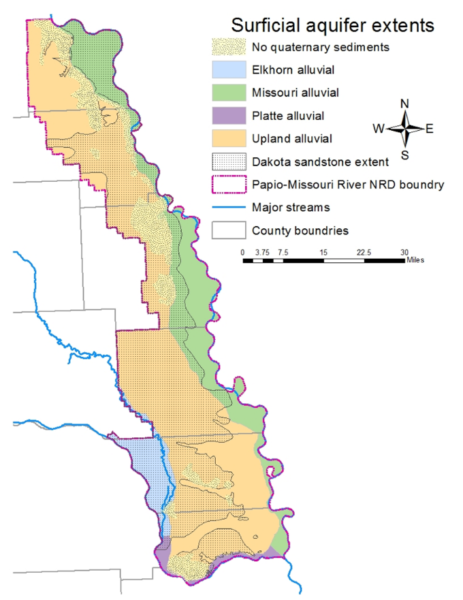Definitions
Groundwater – water beneath the earth’s surface stored in the voids, and cracks between particles of soil, sand, gravel or rock.
Aquifer – An aquifer is a geologic layer or strata of water-bearing material from which groundwater can be extracted.
Overview
The availability and quality of groundwater is highly variable across our District due to the glaciated geology present in Eastern Nebraska. Alluvial (river-based) aquifers are present in the major river valleys of the Platte, Elkhorn and Missouri Rivers and are typically an abundant source of water with wells generally only 50 to 100 feet deep in prevalent sands and gravels. The elevation of groundwater and recharge in these alluvial aquifers is heavily controlled by the flow of surface water in the hydrologically connected rivers. At the other extreme, numerous locations in the uplands, including the majority of the Omaha Metro Area, do not have an underlying aquifer which can produce a reliable source of groundwater. In many of these upland areas, limited sources of groundwater can be found in some shallow water-bearing layers in the loess soils or in underlying sandstone layers known as the Dakota formation.
The quality of groundwater also varies by source and aquifer within the District. Groundwater quality sampling and testing has been completed by the U.S. Geological Survey (USGS) and the NRD since 1992. These results have indicated high levels of nitrate, total solids, and some heavy metals at different times and different locations. The goal of the District’s Groundwater Management program is to work cooperatively with State and Federal Agencies to ensure safe and reliable drinking and well water by using local funding to enhance available information and provide programs aimed at addressing problems.
Quality and availability are the primary reasons a majority of the residents in the Papio-Missouri River NRD are served by municipal water systems or one of the four NRD Rural Water Supply systems.
Groundwater Management Quality and Quantity
When it comes to managing our most precious resource – water – the Papio-Missouri River NRD is actively working both within its boundaries and with others across Nebraska to sustain our available supply and enhance the quality of our water. All of the water that we drink, use in our homes, or irrigate our lawns or farm fields with comes from our area rivers or from groundwater. For this very reason, it is imperative that we strive to better understand and then employ the best strategies to improve our use and protection of BOTH groundwater and surface water.
As required in Nebraska State Statue under the Groundwater Management and Protection Act (Chapter 46, Article 7), it is the job of the NRD’s Groundwater Management Plan to establish goals and actions that will control groundwater uses and protect groundwater from contamination. This dual objective to both sustain the quantity as well as protect the quality of our groundwater requires the P-MRNRD to employ multiple strategies that are explained in further detail by clicking on Groundwater Quality or Groundwater Quantity.
The water in our rivers and the water beneath the ground ARE CONNECTED. Because of this connection, our use of water from rivers can affect groundwater and our use of groundwater can affect the quantity of water in our rivers. Codified in Nebraska State Law, it is the responsibility of the Nebraska Department of Natural Resources (NDNR) to administer surface water rights on all rivers and streams while each local NRD is charged with maintaining appropriate groundwater supplies. Therefore, the management of surface water and groundwater must be done cooperatively between each NRD and NDNR. The framework for this partnership is known as an Integrated Management Plan or IMP. The P-MRNRD and NDNR adopted an IMP in 2014 to protect existing water uses while still planning for future needs. Please learn more about the NRD’s Integrated Management Plan and NDNR’s Integrated Management program by clicking on Groundwater Quantity.
For more information contact:
Philip Paitz, Groundwater Manager Engineer
ppaitz@papionrd.org 402-444-6222


